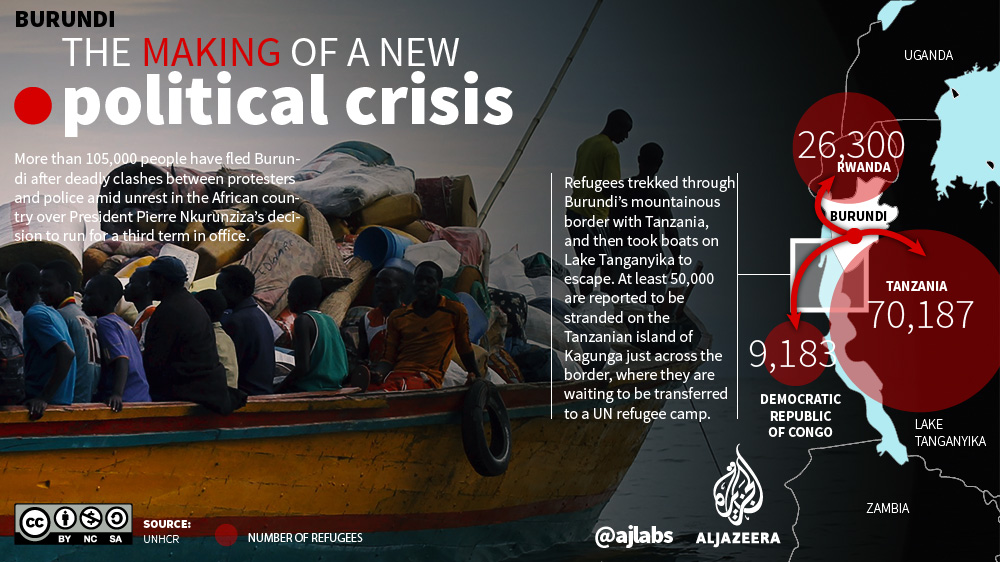Anti-government protests rock Burundi’s capital
At least two demonstrators killed in clashes between protesters and police in Bujumbura as political unrest continues.

Protesters in Burundi have clashed with police in anti-government demonstrations against a third term bid for power by the president, a week on since a failed coup.
At least two protesters were killed and eight were wounded in Thursday’s clashes with police in the capital Bujumbura, the Red Cross said.
Keep reading
list of 4 itemsPalestinian Prisoner’s Day: How many are still in Israeli detention?
‘Mama we’re dying’: Only able to hear her kids in Gaza in their final days
Europe pledges to boost aid to Sudan on unwelcome war anniversary
They are the latest victims of the unrest prompted by President Pierre Nkurunziza’s bid for a third term, in which more than 20 people have died.
Heavy gunfire was heard all day in suburbs of Bujumbura, with intense bursts of automatic weapons, as protesters in reply hurled rocks from makeshift barricades.
Smoke rose from districts of the city where fighting as heaviest.
The sound of gunfire echoed in Bujumbura as night fell, with no apparent sign of easing in the darkness, especially in the Musaga and Kanyosha districts.
Police in Musaga said they had been sent to restore order “whatever the cost”.
Cholera outbreak
More than 110,000 people have fled the violence in Burundi to neighbouring countries, according to the UN.
Humanitarian agencies are struggling to cope as tens of thousands of refugees stranded on Tanzania’s Kagunga Island face dire medical conditions.
UNICEF officials told Al Jazeera on Thursday that conditions at Kagunga were “tough” and that a cholera outbreak had made conditions even more dire.
At least 33 people have died, with 27 deaths believed to have been cholera related.
The World Health Organisation declared cholera a level 1 emergency in the region on Wednesday.
“It is very, very tough in Kagunga, and our focus now is to try and save those living in these very poor conditions,” said Thomas Lyimo, a health officer at UNICEF.

More than 100,000 people have crossed into Tanzania since political unrest began in Burundi on April 26.
At last count, some 70,000 refugees were still in Kagunga, waiting to be transferred to the Nyarugusu camp outside Kigoma.
The political crisis, which began in late April after Burundi’s ruling party nominated Nkurunziza to stand again in the June presidential election, deepened last week when a top general staged a failed coup attempt.
Emmanuel Ntahonvukiye, the newly appointed defence minister, called for unity in the wake of the abortive coup, which was crushed by loyalist forces after street fighting between rival factions.
“The survival of Burundi as a nation depends on the cohesion of the army,” a military statement read, warning that, should the army splinter, it would result in a situation seen in Somalia.
One of those killed was shot as demonstrators tried to reach the National Assembly, where three ministers were sworn in at extraordinary session.
President’s claims
Nkurunziza, in an address to the nation late on Wednesday, said most of the central African country was secure, and that the upcoming parliamentary and presidential votes would be peaceful.
“Peace and security reign over 99.9 percent of Burundian territory and population are going about normally in their activities,” Nkurunziza said in a broadcast on state radio.
Most of the demonstrations took place in Bujumbura’s suburbs.
One group of protesters briefly reached the symbolic city centre, only to be swiftly chased away by the police.
![Nkurunziza argues his first presidential term did not count as he was elected by parliament, not directly by the people [Reuters]](/wp-content/uploads/2015/05/3e948b4a2fb2414a8624dba54ae648dd_18.jpeg)
Opposition and rights groups say that Nkurunziza’s bid for a third five-year term violates the constitution and the terms of the peace deal that brought an end to a 13-year civil war in 2006.
Nkurunziza, a former rebel leader and born-again Christian who believes he has divine backing to lead, argues his first term did not count as he was elected by parliament, not directly by the people.
On Wednesday, his office announced that parliamentary polls set for May 26 had been postponed to June 5, but there has been no mention of rescheduling the June 26 presidential election.
Rights groups accuse Nkurunziza of launching a crackdown on opponents and independent media in the wake of the failed coup.
The presidency has dismissed the claims.
Burundi’s government appears increasingly isolated diplomatically.
Belgium, the former colonial power, threatened on Thursday to end assistance to the country if Nkurunziza presses ahead with a third term.
Additonal reporting from Al Jazeera’s Azad Essa in Kigoma, Tanzania